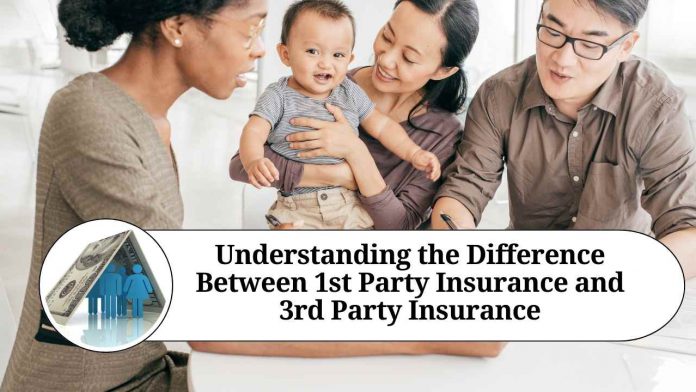Introduction
Insurance plays a vital role in protecting individuals and businesses from unexpected financial losses. When it comes to insurance coverage, there are two fundamental types: 1st party insurance and 3rd party insurance. These terms refer to the parties involved in the insurance policy and the types of coverage provided. In this blog, we will delve into the differences between 1st party insurance and 3rd party insurance, exploring their definitions, purposes, and examples.
What is 1st Party Insurance?
1st party insurance, also known as first-party insurance or own damage insurance, refers to the coverage that a policyholder purchases to protect themselves or their assets from potential risks. The insured party, or 1st party, is the one who directly benefits from this type of insurance coverage. In the event of an incident or loss, 1st party insurance compensates the policyholder for damages to their own property or person.
Examples of 1st Party Insurance:
a. Property Insurance: Homeowners and renters insurance are common forms of 1st party property insurance. They protect the policyholder’s dwelling, personal belongings, and other structures from risks like fire, theft, or natural disasters. b. Auto Insurance: Comprehensive and collision coverage are types of 1st party auto insurance. They cover damages to the policyholder’s vehicle caused by accidents, theft, vandalism, or natural disasters. c. Health Insurance: Health insurance policies provide 1st party coverage for medical expenses incurred by the policyholder in case of illness, injury, or hospitalization.
What is 3rd Party Insurance?
3rd party insurance, also known as third-party liability insurance, is coverage purchased by an individual or entity to protect against claims made by another party due to the insured’s actions or negligence. In 3rd party insurance, the policyholder, or 1st party, is responsible for compensating the 3rd party for damages or injuries caused by their actions.
Examples of 3rd Party Insurance:
a. Liability Insurance: General liability insurance, professional liability insurance, and product liability insurance are common forms of 3rd party insurance. They protect businesses from legal liabilities arising from property damage, bodily injury, or personal injury caused to others. b. Auto Liability Insurance: Mandatory in most jurisdictions, auto liability insurance provides coverage for damages caused by the insured driver to other vehicles or persons in an accident. c. Public Liability Insurance: Public liability insurance covers businesses or individuals against claims for injuries or damages caused to third parties on their premises or as a result of their activities.
In Summary
1st party insurance and 3rd party insurance are two distinct types of coverage that serve different purposes. 1st party insurance protects the policyholder’s own property, health, or assets against potential risks, while 3rd party insurance safeguards the policyholder against claims made by third parties due to their actions or negligence. Understanding the differences between these two types of insurance is crucial for individuals and businesses to make informed decisions when selecting insurance policies tailored to their specific needs. By choosing the right coverage, individuals can mitigate financial risks and ensure peace of mind in the face of unforeseen circumstances.
Read more useful content:
Frequently Asked Questions (FAQs)
Q. What is the main difference between 1st party insurance and 3rd party insurance?
1st party insurance covers the policyholder’s own property, health, or assets in the event of a loss or damage, providing direct benefits to the insured. On the other hand, 3rd party insurance protects the policyholder against claims made by third parties for damages or injuries caused by the insured’s actions or negligence.
Q. Can I have both 1st party insurance and 3rd party insurance for the same incident?
Yes, it is possible to have both types of insurance coverage. For example, in auto insurance, you can have 1st party coverage for damages to your own vehicle (comprehensive and collision coverage) and 3rd party coverage to cover damages you may cause to others (liability coverage).
Q. Which type of insurance is mandatory?
The requirement for mandatory insurance depends on the jurisdiction and the specific situation. Auto liability insurance, which provides 3rd party coverage for damages caused by the insured driver, is often mandatory in many countries. However, the need for 1st party insurance, such as comprehensive or collision coverage, may vary depending on personal choice or financing requirements.
Q. Is 1st party insurance more expensive than 3rd party insurance?
The cost of insurance depends on various factors, including the type of coverage, the insured’s risk profile, and the insurer’s pricing. In general, 1st party insurance coverage tends to be more comprehensive and may come with a higher premium compared to 3rd party insurance coverage. However, it is advisable to compare quotes from different insurance providers to find the best coverage at a competitive price.
Q. Which type of insurance is more suitable for businesses?
Businesses often require a combination of both 1st party and 3rd party insurance coverage. 1st party insurance, such as property insurance or business interruption insurance, protects the business’s assets and operations. 3rd party insurance, such as general liability insurance or professional liability insurance, safeguards the business against claims made by third parties for damages or injuries caused by the business’s activities or products.
Q. Can I upgrade my 3rd party insurance to include 1st party coverage?
It is essential to review your insurance policy and consult with your insurance provider to understand the available options. In some cases, you may be able to enhance your 3rd party coverage with additional 1st party coverage by purchasing endorsements or riders to your policy. However, the availability and scope of such upgrades may vary depending on the insurance provider and the specific policy terms.




















